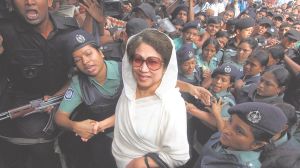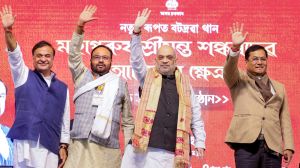Gunning for change
Having insisted and got elections organised in Palestine, as part of the larger project of promoting democracy in the Middle East, the US fi...

Having insisted and got elections organised in Palestine, as part of the larger project of promoting democracy in the Middle East, the US finds itself in a quandary in the wake of Hamas8217;s victory. Before sections of our political establishment relish the thought of seeing the Bush administration and Israel embarrassed, it is important to recognise that India could be a big loser if the Hamas, an extremist religious organisation that is committed to violence as a political instrument, misreads the global response. India could also confront a similar dilemma in Nepal, if the Maoists come to power in a future election and pursue a political doctrine that justifies violence.
The lesson from the Hamas victory is not that democracy is not good for the Middle East. Underlining the recent gains of non-secular forces in various elections in the region 8212; the Shiite parties in Iraq, the Hezbollah in Lebanon, and the Muslim Brotherhood in Egypt 8212; some have argued that Middle East may not be ripe for democracy. India cannot subscribe to such cultural relativism. The rise of religious extremism and violence in the Middle East, it could be argued, is in fact a consequence of prolonged authoritarian rule. In the case of Palestine, an additional factor has been at work 8212; the failure of the peace process with Israel to deliver results.
India must certainly welcome the elections as the beginning of a democratic process in Palestine. At the same time, it must also insist that the Hamas must abjure violence and commit itself to peaceful negotiations with Israel before the rest of the world is prepared to engage with the organisation. Settling for anything less would make India vulnerable to the very charge it so frequently hurls at others 8212; of double standards on terrorism.
- 01
- 02
- 03
- 04
- 05































